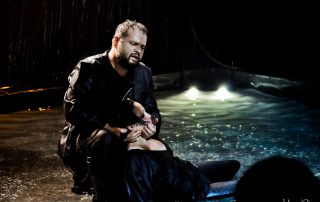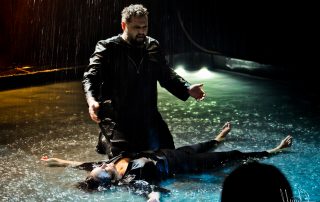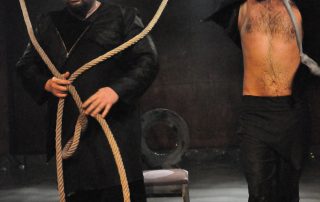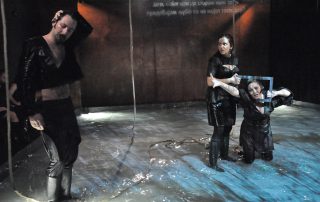OTHELLO
The Turkish Theatre, Skopje, Macedonia
Cast list:
Othello: Dženap Samet
Desdemona: Suzan Akbelge
Iago: Selpin Kerim
Cassio: Osman Ali
Emilia: Zubeyde Ali
Roderigo: Neat Ali
Creative list:
Writer: William Shakespeare
Director: Dejan Projkovski
Choreography: Olga Pango
Music: Goran Trajkoski
Scenography: Tatjana Hristoska Blaževska
Costume Design: Tanja Klaris
Translation: Özdemir Nutku
Senior Director Associate (first assistant): Sibel Abdiu
Director Associate (second assistant): Teodora Siljanoska
Scenography Assistant: Milan Nestorov
Kung Fu Master: Vlatko Zdravkovski
Language: Turkish
Running time: 100 minutes
Director’s Explication
I would like to dedicate this director’s explication to the cast members and all of our collaborators behind the scene who we create our common dreams with. This dedication is for the actors who understand us from a look in the eyes, breath, heartbeat… for the actors who live for the moment, for the incomprehensible, for the inexplicable, for the world which cannot be without our belief. For Selpin, Dženap, Susan, Zubeyde, Neat… for the actors we build and create dreams with. Every new play we create together confirms that there are still actors who work and live committed to the theatre… to the MOMENT that we create… the MOMENT called the theatre. This is the very reason why this is a director’s explanation for my cast members through whom we, I and you my dear audience, hear the SILENCE ON THE STAGE.
Dejan Projkovski
National Institution Turkish Theatre, Skopje, Macedonia
The Turkish Drama, under the Theatre of Minorities in Skopje had its first opening in 1949, supported by the Executive Council of the City of Skopje. The opening performance was “A Suspicious person” by B. Nušić directed by Abdush Husein. In 1975 the theatre got its own building and official name – The Turkish Drama.
In 2004, the Government proclaimed the theatre as a National Institution.
In the course of its six decades of development, the theatre has produced over 280 premiere performances marked by its own distinctive stage expression and it is very well-positioned in the Macedonian cultural life. The Turkish Theatre has its own particular social and cultural structure and it contributes significantly to the affirmation of the multicultural Macedonian society. Today the Theatre enjoys a strong support from its audience and from politicians. The theatre works under financial and professional support of the Ministry of Culture of the Republic of Macedonia.
The Turkish Theatre has co-produced performances with the Atelier 212 Theatre, Belgrade, Yugoslavia; the National Theatre, Marseilles, France; the City Theatres of Istanbul, Turkey; the Laborratorio Nove Firenze, Italy.
———————————–
A PLAY about love and jealousy
The Skopje based Turkish Theatre, with its latest premiere “Othello” continues to be identified as one of the most successful theatre collectives in Macedonia, particularly in regard to its cast. The director Dejan Projkovski staged the play on the small stage and it is from this standpoint, towards the development of a chamber theatre act, that he treats both the text and some of the roles focusing on the psychology of the lead characters and the denouement of the bloody drama.
Todor KUZMANOV
RADIO MACEDONIA
THE TURKISH THEATRE – SKOPJE: “Othello” by Dejan Projkovski – the omnipotence of water and metamessage of evil
Shakespeare’s tragedy “Othello” (1604) directed by Dejan Projkovski and produced by the Turkish Theatre – Skopje is a (chamber) performance that can also be interpreted as a metamessage about the theatre as a space which reflects life. Setting off with a clear vision of what he wants from this present “Othello”, Projkovski chooses six characters from the tragedy, from which he chooses lines and scenes, in order to build his attitude about the director’s and actor’s theatre upon.
Thus, such a theatre is created that, based on the means and commitment to a joint achievement of goals, captures the entire attention of the spectator, who is a “captive” of the thoughts and acting and concepts created in a joint effort by the actors and director.
LJILJANA MAZOVA
GLOBUS









